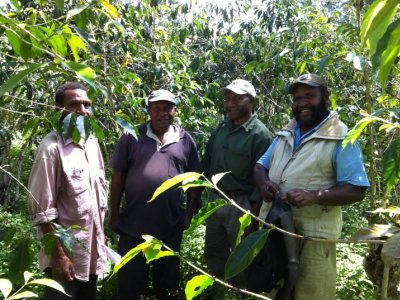Productive Partnerships in Agriculture Project in PNG
The Productive Partnerships in Agriculture Project (PPAP) aims to improve the livelihoods of smallholder cocoa and coffee producers through the improvement of performance and sustainability of value chains in cocoa and coffee-producing areas.
 UniQuest conducted Baseline Surveys in the coffee and cocoa sub-sectors of PPAP, designing survey tools for each sub-sector, training teams of enumerators, developing data input programs and will completed field survey implementation in the second half of 2012 in the Highlands and Islands Regions of PNG.
UniQuest conducted Baseline Surveys in the coffee and cocoa sub-sectors of PPAP, designing survey tools for each sub-sector, training teams of enumerators, developing data input programs and will completed field survey implementation in the second half of 2012 in the Highlands and Islands Regions of PNG.
The survey tools gathered detailed information on demographics, income and expenditure, agronomy and production, and crop certification from 800 households growing coffee in the Highlands and from 400 households growing cocoa in the Islands Region. Our partners in implementing the surveys were UQ’s Institute of Social Science Research and the Kairak Integrated Agriculture Training Centre at the University of Natural Resources and Environment.
There was a particular focus on information access for women farmers and farmers in remote villages. The PPAP program will monitor the changes to smallholder household conditions and assess the costs and benefits of sustainability practices introduced through PPAP.
The Baseline Surveys for Productive Partnerships in Agriculture Project is an important component of the PPAP, as they establish a baseline set of measurable indicators that will provide the means for measuring changes to both smallholders and their household conditions as a result of PPAP, including the adoption and impact of sustainable practices and certification. Information from this and subsequent surveys, will enable PPAP to obtain real-time information regarding the impact of its interventions, which will assist ongoing implementation of the project.
The surveys conducted by our research team involved problem identification, defining objectives, sampling and stratification, data collection, analysis and drawing conclusions. The research team implemented each survey in three stages:
- Planning – defining the aims and objectives, designing and testing the questionnaire, and deciding how the sample of people to be interviewed will be selected
- Field interviewing – preparing interview materials, training enumerators, conducting the interviews and checking for completeness
- Analysis and report writing – data entry and analysis, preparing and publishing a report, communicating and publicising the results.
Our approach to ensuring success in TA implementation involved:
- Establishing clear lines of communication and roles and responsibilities in implementation among the numerous stakeholders involved in the TA, including both the public and private sectors
- Knowledge transfer and training using “learning by doing” and mentoring support approaches
- Building productive partnerships using existing information and networks
- Fostering local ownership and commitment to monitoring and guiding PPAP
- Mainstreaming gender through survey activities
- Ensuring the inclusion of relevant isolated communities wherever possible
- Promoting international best practice in survey design, implementation and assessment methodologies.
Duration: January 2012–November 2016
Funding source: World Bank
